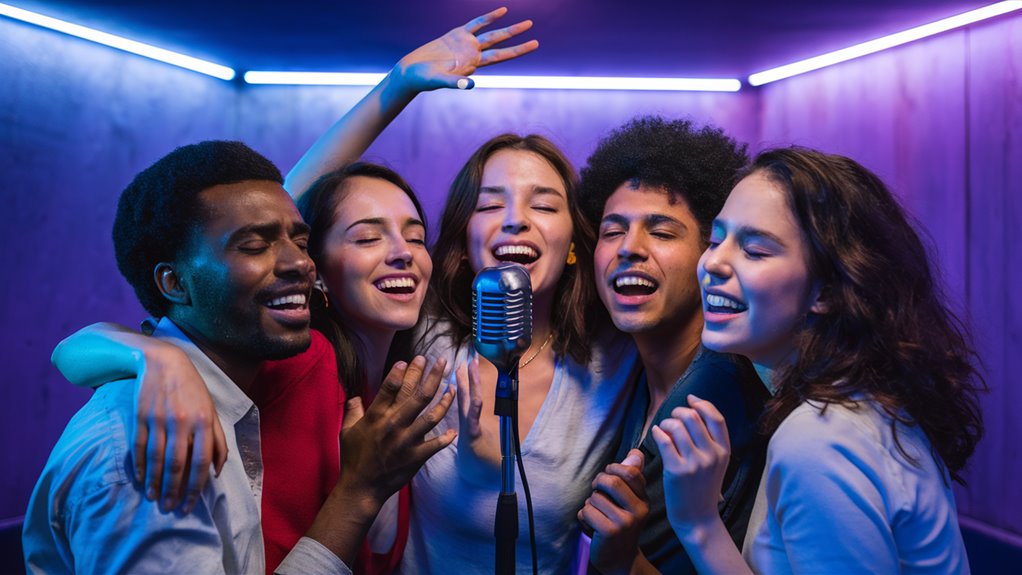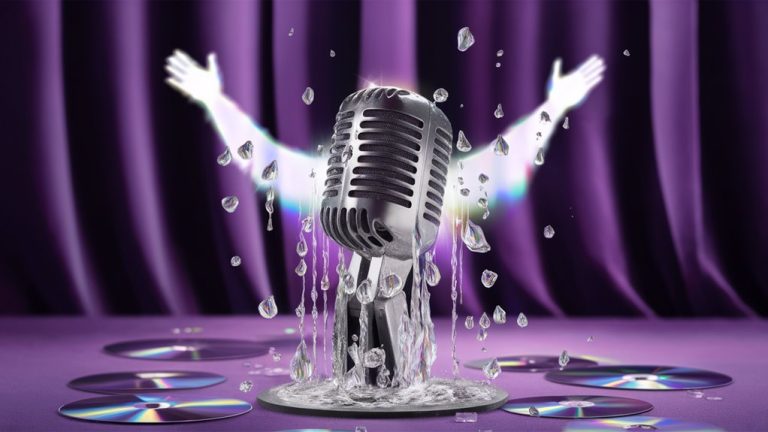
The Science Of Why Karaoke Sing Your Happy
The Neurochemistry Of Karaoke
Dopamine is released by singing that triggers the pleasure centre of the brain and makes you feel high. Meanwhile the endorphins produced when you sing also work as a pain reliever but they also elevate mood. The hypothalamic response counterbalances stress hormones, putting us in a state of natural calm and wellbeing.
Social And Physiological Benefits If You Like Karaoke
Encourages significant oxytocin production which strengthens social bonding (the “bonding hormone”) In your body, would result in a noticeable improvement breathing and heart rate variability, which in turn creates both physical wellness and psychological well-being. During this time, people experience the phenomenon of collective effervescence, which makes them happier and leads to social consensus.
Brain-body Connection In Musical Performance
The act of singing involves sophisticated neural pathways activating mirror neurons that intensify social connection and empathy in humans Successful performances bring with them mastery experiences. karaoke It boosts self-efficacy to gain further actual achievements by making a good impression on oneself and sense of pride. Thus from performing music in an integrated way with body and mind like this positive emotions and physical benefits are transmitted back into the system. Everyone benefits from it.
Long-term Mood Lowering
Long-term regular karaoke participation can result in improvements overall in emotional well-being as a result of changes to the brain’s reward circuits: because physical interaction and singing give immediate and lasting positive effects on mood regulationand stress management. These benefits extend beyond the individual performance and so contribute to overall mental health furthermore emotional solidity.
The Chemical Symphony Singing The Chemical Symphony of Singing
Singing’s amazing biochemical reaction goes far beyond mere joy.
During vocal performance especially as you approach those challenging high notes the body begins a complex cascade of neural and hormonal reactions.
After a performance, your bodys production of endorphins jumps up by as much as 45 times previous levels, sending forth powerful natural pain killers and mood-enhancing chemicals into your bloodstream. Scientists use the term performance-induced euphoria to define this phenomenon a natural lift in spirits that lasts for hours even after the concert is over.
Triggers: Neurochemical Changes
Singing triggers a biochemical symphony in the brain and body that would require several volumes to explain fully.
When vocalists are engaged in performance, their bodies discharge a heady mix of neurotransmitters and hormones:
- Endorphins: Natural painkillers
- Dopamine: The pleasure chemical
- Oxytocin: The bonding hormone
- Serotonin: Mood regulation neurotransmitter
This potent chemical mix results in sustained well-being, with concrete changes in the brain’s chemistry and neural activity to back the feeling up. The euphoria of singing comes from very specific biological events a scientifically-proven rather than subjective sensation.
Your Brain on Music
How Your Brain Processes Melody and Rhythm: The Neuroscience of Music
Neural Activity and Musical Processing
Far-reaching neural patterns are created in the brain by musical stimulation.
Brain imaging shows that the nucleus accumbens gets a dopamine hit while you are listening to music, as does the amygdala when you recognize emotional content.
Pitch, rhythm and harmonic structure are all dissected by the auditory cortex at the same time, giving rise to complex neural patterns.
Active Musical Engagement and Brain Function
When one is singing, the brain’s other neural pathways get into gear rather than merely being passive listeners.
- The motor cortex oversees vocal muscle activity, while areas such as Broca’s and Wernicke’s process language elements of speech.
- The cerebellum takes charge of exact timing and smooth coordination during musical activities.
Brain Synchronization and Musical Benefits
When brain oscillations become synchronized with musical rhythms, cognitive processing is enhanced.
The consequence of this synchronization is improved memory formation and feelings of emotion.
The hypothalamus responds by lowering stress hormones, while the limbic system releases endorphins this makes for a positively emotional experience when engaged in music.
Key Neural Responses to Music:
- Dopamine release in the nucleus accumbens
- By activating the amygdala, emotional processing goes on
- Cerebellum interest is a pre-requisite for motor coordination
- A hypothalamic response is the mechanism winding to relieve stress
- Neural synchronization promotes improved memory
The Social Power of Music: Building Connections Through Song
The Neurological Benefits of Group Singing
Singing in a group brings both tremendous neural benefits and it also confers a benefit that, when shared with others, is shared even more. Group singing can raise the levels of this hormone, which has been described by one sociologist as the bonding hormone itself because it strengthens social trust and connection.
Research shows that group singing makes participants’ cardiovascular rhythms and respiratory patterns synchronize with those of their neighbours, often creating strong physiological inter-bonding and enhanced group unity.
The Experience of Singing in a Group
Song and Social Bonding
Karaoke has a very special atmosphere for society. It is where those that have opened up to others will find that their personal relationships grow stronger and deeper.
Whether group music-making produces an immune response through endorphin production or sees stress hormones drop more powerfully than a solo performance is under research.
The bio-energetics of social brain resonance is gradually being understood where collective entrainment creates an immediate, measurable upwelling in both social cohesion and participants emotional well-being.
Collective Singing and Empathy
During group singing, the social synchrony activates specialized neural networks which are linked to empathy and social cognition of their content about The brain’s mirror neuron system becomes engaged in touching with others, enabling singers to more readily pick up emotions and modes not directly given in verbal terms of others.
The Psychology of Stage Performance
Performance Psychology in Karaoke: Understanding the Science Behind the Spotlight
Once you take the stage at karaoke, a special kind of psychology has been set in motion, one that determines how both performer outcomes and audience dynamics will turn out. This subtle psychological process involves the operation of multiple cognitive and emotional mechanisms that directly influence performance quality as well as crowd connection.
Physiologically and Neurologically, Musical Performance
VIP Treatment at a Karaoke Bar a performer walks out into the spotlight his brain will begin to per Membronicences excitement state and his systems of neurological reactions are set in motion. This brings increased sensory acuity levels and intellectual finesse.
The Yerkes-Dodson law shows moderate stress levels can optimize performance capabilities, but excessive anxiety will decay at execution levels.
Sociocognitive Administration of Skills
Social facilitation theory occupies a pivotal role in successful karaoke performances, thanks to the empowerment effect of the audience’s presence.
Mirror neurons in the brain create dynamic feedback loops between performer and audience, enabling a shared mood or atmosphere.

Performance Greats and Flow
Feeling of flow is often achieved when performance challenges current capabilities and perceived ability are well-matched. This creates a state which peak engagement and self-consciousness diminish, even as performance quality improves.
- Neurochemical optimization through controlled stress response
- Mirror neuron activation creates feedback loops between performer and audience
- Flow state requires a balance between challenge and skill
- Crowd presence will enhance the social facilitatory effect
- Performance arousal management to produce optimal execution
Recreational Singing as a Relief from Stress
The Science Behind Singing and Stress Relief: A Detailed Guide
Singing activates multiple pathways in the body, which respond naturally and effectively to alleviate stress.
Endorphins and oxytocin are released, while cortisol levels are simultaneously lowered the result is a dramatic antistress effect. The combination of physical and neurological effects of controlled breathing patterns that are necessary for vocal performance helps to initiate a natural relaxation response in the body’s parasympathetic system.
Songs Help You Reduce Stress
Recreational music-making, particularly through activities like karaoke, offers significant stress-reduction benefits to everybody no matter how you sound.
Behavioral Science Studies For Stress Relief
In clinical trials, singing in a group reduced not only cortisol levels but also provided relief from anxiety and depression symptoms. It made no difference to the benefits whether they sang well or badly, so this is stress relief through songstress for all.


